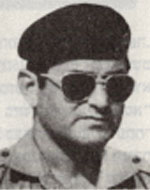Meshulam, son of Miriam and Shlomo, was born on May 14, 1935 in Czernowitz, Romania, and immigrated to Israel with his family in 1949. His mother and brother settled in Haifa and studied at the religious youth village in Kfar Hasidim. He was a life-loving, active and energetic person, a person who is Simcha and knows how to please others, by nature, honest and conscientious, always demanded truth and justice, and was not willing to compromise and act. Meshulam was drafted into the IDF in mid-March 1953, and since then he devoted his life to the IDF and the Armored Corps, and was involved in the establishment and construction of the corps and saw it in its development, And became the main corps of the ground forces Meshulam was involved in the introduction of new and sophisticated tools for the active service and the establishment of many generations of fighters, and during his service in the Armored Corps he served in various armored corps training courses. As a lieutenant colonel, led his platoon in the battles to conquer Sinai in the Sinai Campaign. Later, he trained in intelligence officers and served as a battalion intelligence officer and as an operations officer in a tank battalion. He was then sent to a company commanders’ course and after successfully completing the course he was promoted to the rank of captain and appointed to the rank of company commander. He also served as a staff officer in the armored corps headquarters. In 1961 he was promoted to Major and two years later was appointed deputy commander of a tank battalion. In 1965, he successfully completed his studies at the Inter-Branch Command and Staff Training College in the Six Day War. After the end of the fighting, he served with the battalion in Sinai and at the beginning of 1968 was appointed chief instructor at the Armored Corps training facility, and in November 1969 he was promoted to lieutenant colonel and received a tank battalion in Sinai. Days. Meshulam headed the battalion during the difficult period of the War of Attrition. In March 1971 he was appointed deputy commander of a tank division in Sinai, which was responsible for securing the Suez Canal and the Sinai Peninsula, within the framework of the armored forces headquarters in Sinai. After a long service in Sinai, he was transferred to the Armored Corps School and was appointed commander of the Company Commander Course, which is the second most important course in the Armored Corps. In 1973 he was commander of the Armored Corps course, the senior course in the Armored Corps. Meshulam has filled many different roles in the Armored Corps. He was the commander of field units, a field officer in field units and a staff officer in the armored corps headquarters. He also taught at the Armored Corps School. In his positions in field units he excelled in command and leadership skills. He was an excellent professional, well versed in armor warfare and a strict commander, who required his soldiers to perform perfectly their duties. The units under his command carried out all the tasks assigned to them in full and accurately and achieved excellent achievements in training and operational activity. In leadership positions he excelled in organizational ability and management ability, when he was responsible for operating large units. He took care of small details and said that keeping order and strict discipline was a guarantee of the unit’s success on the battlefield. Meshulam acquired a great deal of knowledge in armored corps doctrine, in the operation of the tanks and in combat doctrine. He also knew how to impart the knowledge he had acquired to his soldiers and students in courses. Meshulam’s life moved in two parallel tracks. One was his army service in the Armored Corps, and the second was his life in the warm family nest he established after he married his girlfriend Ayala, who was introduced to her when he was at the Youth Aliyah institution and after they married, they founded their home in Be’er Sheva. 1964 his daughter Talila was born and in 1970 his daughter was bornThe young Sigal. When the Yom Kippur War broke out, Meshulam was appointed commander of a tank battalion within the framework of the 188th Brigade, which fought in the battle of containment and the breakthrough against the Syrians in the Golan Heights. In a battle that took place in the region of Hermonit on October 9, 1973, Meshulam was hit and killed. He was brought to rest in the cemetery in Be’er Sheva. He left behind a wife, a son, two daughters, and a brother. In May 1975, Lieutenant Colonel Meshulam Ratts commanded a tank battalion in the northern sector of the Golan Heights. Despite the difficult conditions, he succeeded in conducting an effective and stubborn defense battle, and prevented the fall of the line posts and the conquest of the Al-Rum farm. On October 9, 1973, he led his depleted force to a frontal attack on the Syrians, who managed to penetrate the Har Hermon region. While making contact with the enemy was injured and killed. Lt. Col. Meshulam Ratts commanded an unarmed force at the beginning of the battle, but in the course of the war he managed to crystallize and derive from him the full combat capability, serving as a personal example of his courage, his cool and his optimism. For this act he was awarded the Medal of Valor. “
